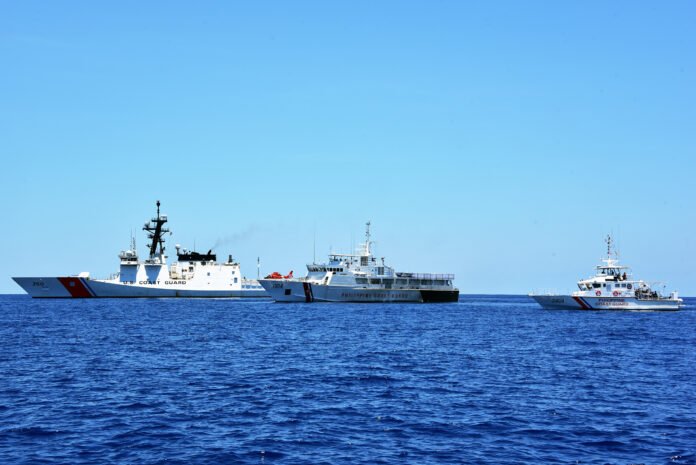President Ferdinand Marcos Jr. has taken decisive action in response to China’s increased aggression against Philippine vessels in the West Philippine Sea (WPS) by ordering the enhancement of the country’s maritime security measures.
Through Executive Order (EO) No. 57, President Marcos has established the National Maritime Council (NMC) with the aim of bolstering the Philippines’ maritime security and improving maritime domain awareness.
The President emphasized the persistent challenges faced by the Philippines in safeguarding its maritime domain, highlighting threats to territorial integrity and the well-being of Filipinos. He underscored the importance of ensuring peace, freedom, and security for citizens, free from violence and intimidation.
Following recent incidents involving the China Coast Guard (CCG) targeting Philippine vessels, including the Unaizah May 4 on a resupply mission to troops at Ayungin (Second Thomas) Shoal, the President took decisive action. On March 25, he issued Executive Order 57, responding swiftly to the CCG’s use of water cannons against Filipino ships.
The National Task Force on the West Philippine Sea (NTF-WPS) condemned the CCG’s actions as reckless and dangerous, particularly noting their aggression towards Philippine Coast Guard (PCG) escort vessels like BRP Sindangan and BRP Cabra. These events highlight ongoing tensions and the need for vigilance in protecting Philippine sovereignty and maritime interests.
The UM4 suffered significant damage and three of its crew members were injured due to the water cannon attack.
President Marcos affirmed the Philippines’ dedication to preserving freedom of navigation and overflight in the West Philippine Sea, aligning with the United Nations Convention on the Law of the Sea.
Emphasizing the necessity of enhancing maritime security and domain awareness, the President highlighted the importance of addressing various issues affecting national security, sovereignty, sovereign rights, and maritime jurisdiction over extensive maritime zones.
Beijing asserts control over the vast majority of the South China Sea, a crucial waterway responsible for over $3 trillion in annual maritime trade. However, this claim conflicts with those of several other nations including the Philippines, Vietnam, Indonesia, Malaysia, and Brunei.
In 2016, an arbitral tribunal adjudicating a case brought by Manila against Beijing declared that China’s territorial claims lacked legal justification.
The National Coast Watch Council (NCWC) has undergone a significant transformation as per Executive Order 57, disclosed to the public on Sunday. This executive order has led to the renaming and restructuring of the NCWC into the National Maritime Council (NMC).
Under EO 57, the NMC has been granted the authority to receive donations, aid, or gifts from both local and foreign entities. Additionally, the NMC has been instructed to develop comprehensive guidelines delineating the specific responsibilities of each supporting agency, along with their personnel and equipment requirements.
These guidelines will also outline a systematic transition plan for the migration of personnel and equipment from the previous NCWC framework to the reconstituted NMC structure. Furthermore, the NMC is mandated to establish and manage the National Maritime Center, which will oversee the implementation of the nation’s maritime security policies.
Mr. Marcos, in his directive, has tasked the NMC with formulating policies and strategies aimed at creating a unified, well-coordinated, and efficient governance framework for the nation’s maritime security and domain awareness initiatives.
Executive Secretary Lucas Bersamin will lead the National Maritime Council (NMC), which comprises members from various government agencies including the National Security Council (NSC), Department of National Defense, Department of Foreign Affairs, Department of Finance, Department of Agriculture, Department of Energy, Department of Environment and Natural Resources, Department of the Interior and Local Government, and Department of Transportation.
Supporting agencies affiliated with the NMC encompass the Philippine Coast Guard (PCG), Armed Forces of the Philippines, Philippine National Police, Bureau of Customs, Bureau of Immigration, National Bureau of Investigation, Bureau of Fisheries and Aquatic Resources, Philippine Center for Transnational Crime, Philippine Drug Enforcement Agency, and National Mapping and Resource Information Authority.
Additionally, the National Task Force on the West Philippine Sea (NTF-WPS) will be integrated into the NMC structure, pooling together the resources and strategies of member-agencies for coordinated efforts in the West Philippine Sea (WPS).
Amid China’s escalating aggression and in response to the President’s directive to bolster the nation’s maritime security, Rear Adm. Armando Balilo, the PCG spokesperson, announced on Sunday plans to intensify their efforts in enhancing maritime domain awareness.
Balilo emphasized that while their core responsibilities remain unchanged, recent incidents of aggression necessitate a proactive approach. He highlighted the intention to ramp up operations, particularly in areas like Ayungin and Bajo de Masinloc, where tensions are high.
As part of the National Security Council (NSC) and the National Task Force on the West Philippine Sea (NTF-WPS), the PCG is committed to executing orders aimed at preserving peace and security in the region. Balilo reaffirmed their dedication to these directives.
Balilo affirmed that despite China’s aggressive behavior and recent confrontations, our personnel are steadfast in their commitment to obey the government’s directive to uphold our presence in the West Philippine Sea. They will not be swayed by the ongoing events.




